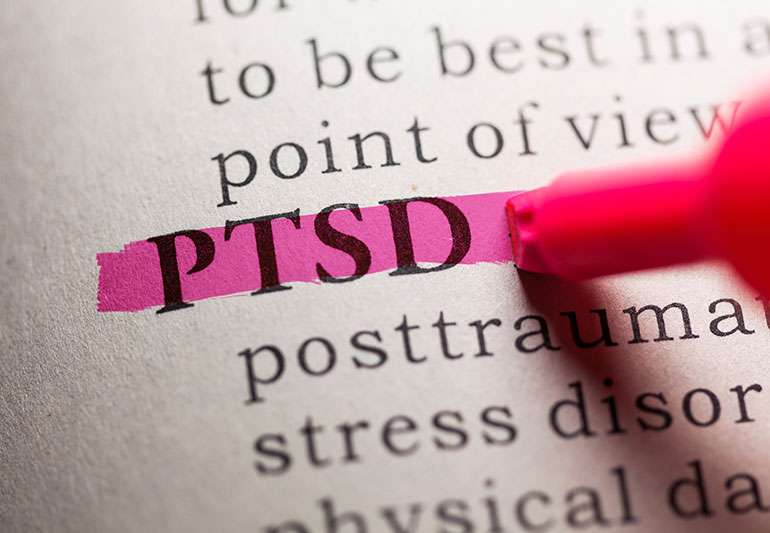PTSD is a debilitating disorder that can affect a person’s everyday life. Learn what is is like to live with PTSD and the steps people can take to cope with the disorder.
When someone experiences a traumatic event, it may cause them to develop post-traumatic stress disorder (PTSD) later on in life. Living with PTSD can be debilitating and may affect a person’s ability to function healthily in their everyday life. They may feel alone and helpless. However, PTSD is a common anxiety disorder and there are multiple treatment options to help someone address the disorder and recover from the traumatic event.
What is it like living with PTSD? The answer to this question varies depending on the type of trauma a person experienced or witnessed. There are similarities in symptoms and the ways that PTSD presents itself. In all cases, having a support system to lean on will greatly improve a person’s chance at recovery.
What Does PTSD Feel Like?
How PTSD affects someone varies from person to person and depends on the type of trauma they experienced. In general, people diagnosed with PTSD will experience symptoms within one month from the traumatic event. Occasionally, the onset of symptoms can be delayed by up to three months following the traumatic event.
Many people will experience PTSD nightmares, where they dream about the traumatic event they experienced. In these dreams, people may feel like they are reliving the event and experiencing the emotions or physical pain that was associated with it. Reliving the events can also occur when a person is awake, in flashbacks that feel like the person is experiencing the event all over again. Flashbacks can be debilitating, making it hard for the person to concentrate or accomplish simple tasks.
Other PTSD symptoms include:
- Troubling memories
- Vivid flashbacks
- Consistent negative mood
- Being easily startled
- Avoiding reminders of the trauma
- Feeling depressed
- Blaming oneself for the event
- Having problems concentrating or sleeping
- Feeling irritable or easily agitated
- Loss of interest in previously enjoyed activities
- Feeling detached from others
How Does PTSD Affect Daily Life?
PTSD can greatly affect a person’s everyday life, making it hard for them to function as they usually would. When the effects of PTSD are so severe that a person regularly has panic attacks, it can have an effect on their career. When someone is afraid of going outside or driving a car due to their PTSD, it makes it hard for them to get to work or do simple tasks like grocery shop. As a result, they may lose their job or develop additional, serious mental health issues.
When someone becomes isolated as a result of their PTSD, it can also wear on their personal relationships with others. They may feel as though those around them cannot relate to what they are going through. They may also have issues with trust or intimacy, which can make it hard to maintain relationships.
Can You Live a Healthy Life with PTSD?
Yes, living a healthy life with PTSD is possible. A person struggling with PTSD should seek out a treatment plan that will work for them to get them on track to managing their PTSD. For some people, the disorder will never completely go away, but there are skills they can learn to make sure that the anxiety associated with their PTSD does not control their life.
Tips for Coping with PTSD
When PTSD is controlling a person’s life and they are unable to function healthily, the best step they can take is seeking professional help. A trained professional will help the person get the treatment they need to overcome the anxiety of their specific situation. Treatment for PTSD will typically involve therapy and, in some cases, medication to cope with anxiety.
In addition to getting professional treatment, there are several additional steps a person can take on their own to help cope with the symptoms of PTSD. Some tips for coping with PTSD include:
- Make time for self-care: Self-care can be eating healthy, getting enough sleep or making time to do activities that you enjoy.
- Practice mindfulness: Mindfulness is when a person focuses on the present, including how they are feeling, how they are breathing and what is in their surroundings. Yoga and meditation are good ways to practice mindfulness.
- Engage in physical activity: Physical activity can reduce the severity of symptoms associated with PTSD.
- Develop a support group: Having friends and family that are understanding of your disorder and will check on you, even when you are avoiding them, will help you through your recovery.
- Consider getting a therapy dog: Studies have shown that therapy dogs can help people with PTSD relax and reduce the stress and anxiety they feel about the traumatic event.
- Avoid drugs and alcohol: Drugs and alcohol can make the symptoms of PTSD worse.
If you or a loved one developed a substance use disorder while attempting to self-medicate symptoms of PTSD, contact The Recovery Village to speak with a representative about how professional addiction treatment can help. The Recovery Village’s individualized treatment programs ensure that each person can address their substance use disorder along with any co-occurring mental health disorders. Take the first step toward a healthier future, call today.

Editor – Thomas Christiansen
With over a decade of content experience, Tom produces and edits research articles, news and blog posts produced for Advanced Recovery Systems. Read more

Medically Reviewed By – Dr. Trisha Sippel, PhD
Dr. Sippel is a diversely trained scientist with expertise in cancer biology and immunology. Read more
Medical Disclaimer
The Recovery Village aims to improve the quality of life for people struggling with substance use or mental health disorder with fact-based content about the nature of behavioral health conditions, treatment options and their related outcomes. We publish material that is researched, cited, edited and reviewed by licensed medical professionals. The information we provide is not intended to be a substitute for professional medical advice, diagnosis or treatment. It should not be used in place of the advice of your physician or other qualified healthcare providers.
Post-traumatic stress disorder (PTSD) is a set of reactions that can develop in people who have experienced or witnessed a traumatic event that threatens their life or safety (or of others around them). This could be a car or other serious accident, physical or sexual assault, war-related events or torture, or a natural disaster such as bushfire or flood.
In the first days and weeks after a traumatic event, people often experience heightened arousal, alertness, looking for danger and being on guard. These reactions often alternate with numbness and detachment. It also brings constant memories of the event and feelings it may happen again. It also evokes strong feelings of fear, sadness, guilt, anger, or grief. Generally these reactions and feelings will resolve on their own over the next few weeks, however if the reactions and distress continue, it may mean that the person has is at risk for developing PTSD or another mental health condition.
Anyone can develop PTSD following a traumatic event, but people are at greater risk if:
- the event involved physical or sexual assault
- they experienced intense helplessness
- the event involved something they never thought would happen to them
- they have had other traumatic experiences involving helplessness or danger including physical or
sexual abuse
, car accidents, criminal events, natural disasters or conflict
- they have suffered from PTSD in the past.
Symptoms of PTSD
A person with PTSD has four main types of difficulties:
- Re-living the traumatic event through unwanted and recurring memories, flashbacks or vivid nightmares. There may be intense emotional or physical reactions when reminded of the event including sweating,
heart palpitations
,
anxiety
or
panic
.
- Avoiding reminders of the event, such as thoughts, feelings, people, places, activities or situations that bring back memories of the event. They may feel numb, empty or detached.
- Negative changes in feelings and thoughts, such as feeling angry, afraid, guilty, flat or numb, developing beliefs such as “I’m bad” or “The world’s unsafe”, and feeling cut off from others.
- Being overly alert or ‘wound up’ indicated by
sleeping difficulties
, irritability, lack of concentration, becoming easily startled and constantly being on the lookout for signs of danger.
A health practitioner may diagnose PTSD if a person has symptoms in each of these four areas for a month or more, which lead to significant distress or impacts on their ability to work and study, their relationships and day-to-day life.
People with PTSD can also have what are termed ‘dissociative experiences’, which are frequently described as:
- “It was as though I wasn’t even there.”
- “Time was standing still.”
- “I felt like I was watching things happen from above.”
PTSD in children and teenagers
Older children and teenagers experience similar problems to adults when they develop PTSD. Younger children can express distress in a different way. For example, they may re-live the traumatic event through repetitive play rather than having unwanted memories of the event during the day. Many children have frightening dreams without recognisable content rather than nightmares that replay the traumatic event. Children may also lose interest in play, become socially withdrawn, or have extreme temper tantrums.
About one third of children who experience a traumatic event will develop PTSD.
Other problems that can develop alongside PTSD include anxiety or depression, defiant behaviour, attention deficit hyperactivity disorder, and in teenagers and young adults, suicidal thoughts and alcohol or drug use.
Impact of PTSD on relationships and day-to-day life
PTSD can affect a person’s ability to work, perform day-to-day activities or relate to their family and friends. A person with PTSD can often seem uninterested or distant as they try not to think or feel in order to block out painful memories. They may stop them from participating in family life or ignore offers of help. This can lead to loved ones feeling shut out.
It is important to remember that these behaviours are part of the problem. People with PTSD need the support of family and friends but may not understand what is happening to them or think that they need help.
When PTSD goes on for some time, it is not unusual for people to experience other mental health problems at the same time. In fact, up to 80 per cent of people who have long-standing PTSD develop additional problems – most commonly depression, anxiety, and alcohol or other substance misuse. These may have developed directly in response to the traumatic event or as a result of the effects of having PTSD.
Risky alcohol and drug use with PTSD
People commonly use alcohol or other drugs to blunt the emotional pain that they are experiencing. Alcohol and drugs may help block out painful memories in the short term, but they can get in the way of a successful recovery and cause other serious problems.
When to seek help for PTSD
A person who has experienced a traumatic event should seek professional help if they:
- don’t feel any better after two weeks
- feel highly anxious or distressed
- have reactions to the traumatic event that are interfering with home, work and/or relationships
- are thinking of harming themselves or someone else.
Some of the signs that a problem may be developing are:
- being constantly on edge or irritable
- having difficulty performing tasks at home or at work
- being unable to respond emotionally to others
- being unusually busy to avoid issues
- taking risks or not caring what happens to oneself
- using alcohol, drugs or
gambling
to cope
- having severe sleeping difficulties.
Support is important for recovery
Many people experience some of the symptoms of PTSD in the first two weeks after a traumatic event, but most recover with the help of family and friends. For this reason, for a diagnosis of PTSD is not made until a month after the event. Treatment does not usually start for at least two or more weeks after a traumatic experience. However if the event is very distressing and emotions and reactions are intense, it is advisable to seek help as early as possible to understand what is happening and help recovery to start.
It is important during the first few days and weeks after a traumatic event to get whatever help is needed. This may include accessing information, people and resources that can help you to recover. Support from family and friends may be all that is needed. Otherwise, a doctor is the best place to start to get further help.
Treatment for PTSD
If you are still experiencing problems after two weeks, a doctor or mental health professional may discuss starting treatment. Effective treatments are available. Most involve psychological treatment such as counselling to understand what is happening and to develop ways of managing reactions, but medication can also be helpful. Generally, it’s best to start with psychological treatment rather than use medication as the first and only solution to the problem.
The cornerstone of treatment for PTSD involves confronting the traumatic memory and working through thoughts and beliefs associated with the experience as part of a safe relationship with a trained person.
Trauma-focussed treatments can:
- reduce PTSD symptoms
- lessen anxiety and depression
- improve a person’s quality of life
- be effective for people who have experienced prolonged or repeated traumatic events, though treatment may be required for a longer period.
Treatment for children and teenagers with PTSD
For children and teenagers who are struggling to recover after a traumatic event, the recommended treatment is trauma-focussed cognitive behavioural therapy (CBT). This treatment involves:
- learning about the type of traumatic event experienced (e.g. how common it is) and common reactions to trauma
- teaching how to relax and manage anxiety
- helping to create a coherent story of the traumatic event, and correct any unhelpful beliefs about the event such as self-blame
- gradual exposure to trauma-related objects or situations that are feared or avoided
- helping to get back into everyday activities.
Information in your language
Where to get help
General telephone counselling services can provide advice:




